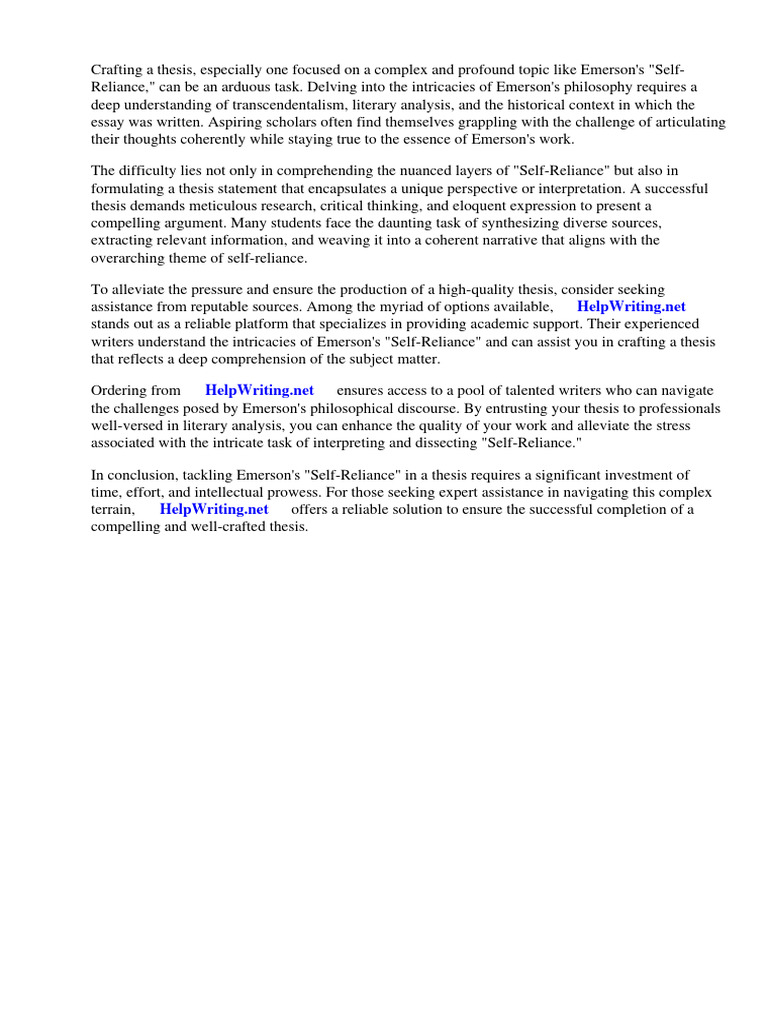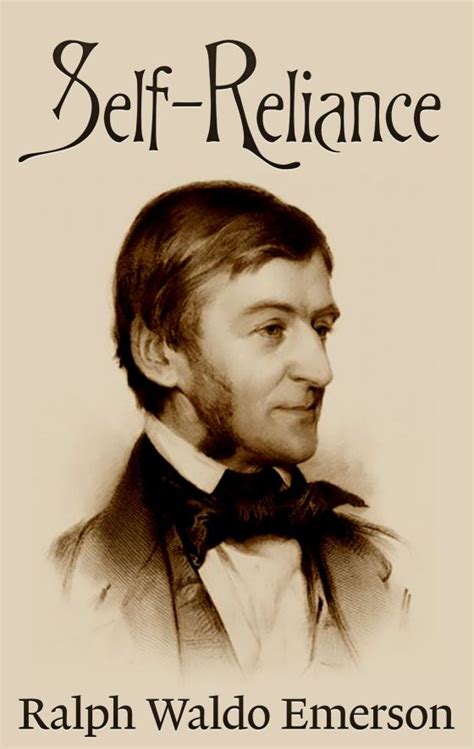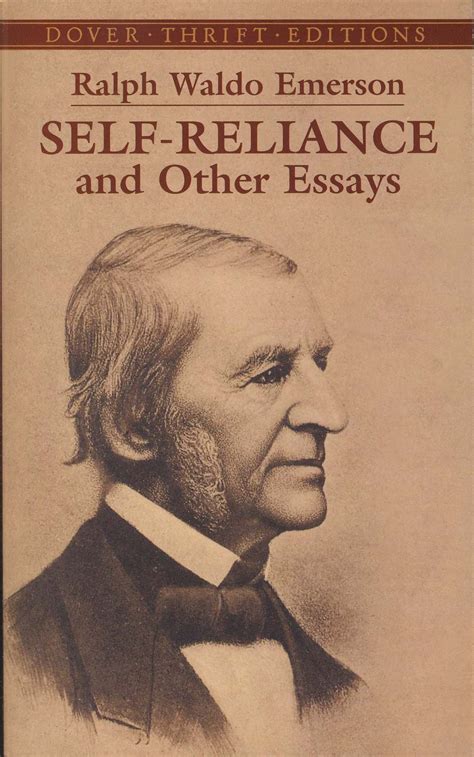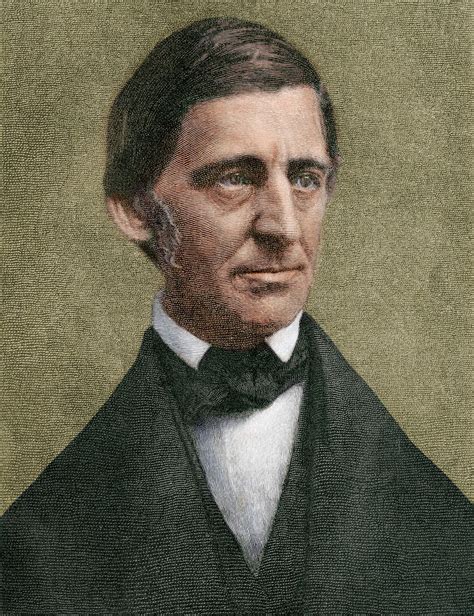Emerson's Self Reliance

Ralph Waldo Emerson's essay "Self-Reliance" is a cornerstone of American literary and philosophical heritage, first published in 1841. This influential work has been widely read and debated for its profound insights into the human condition, individualism, and the pursuit of personal freedom. As a foundational text of Transcendentalism, "Self-Reliance" embodies the spirit of intellectual and spiritual inquiry that defined the American Renaissance. In this essay, Emerson argues that individuals should trust their own instincts and thoughts, rather than conforming to societal norms or expectations.
At its core, "Self-Reliance" is an exploration of the tension between individuality and conformity. Emerson contends that people are often pressured to conform to societal standards, sacrificing their unique perspectives and experiences in the process. He argues that this conformity stifles creativity, innovation, and personal growth, leading to a lack of authenticity and fulfillment. In contrast, self-reliance allows individuals to tap into their inner resources, cultivating a sense of purpose and direction that is grounded in their own values and beliefs. As Emerson so eloquently puts it, "To be yourself in a world that is constantly trying to make you something else is the greatest accomplishment."
Key Points
- Emerson's concept of self-reliance emphasizes the importance of individuality and nonconformity.
- The essay argues that people should trust their own instincts and thoughts, rather than conforming to societal norms.
- Self-reliance is seen as a means of cultivating personal growth, creativity, and authenticity.
- Emerson's ideas have had a profound impact on American literature and philosophy, influencing thinkers such as Henry David Thoreau and Walt Whitman.
- The essay remains a powerful and thought-provoking work, continuing to inspire readers to this day.
The Importance of Nonconformity

One of the central themes of “Self-Reliance” is the importance of nonconformity. Emerson argues that individuals should not be afraid to challenge societal norms and expectations, even if it means being seen as unconventional or unconventional. He believes that this willingness to take risks and challenge the status quo is essential for personal growth and development. As he notes, “Whoso would be a man, must be a nonconformist.” This emphasis on nonconformity is not about rebelling for its own sake, but rather about being true to oneself and one’s values.
The Role of Intuition
Emerson also places a strong emphasis on the role of intuition in his concept of self-reliance. He believes that individuals should trust their instincts and listen to their inner voice, rather than relying solely on reason or external authority. This intuition is seen as a source of wisdom and guidance, allowing individuals to navigate the complexities of life with greater ease and confidence. As Emerson puts it, “The inmost soul of man tells him that he is right, whilst the whole world is against him.” This trust in intuition is not about abandoning rational thought, but rather about cultivating a deeper sense of awareness and connection to oneself and the world.
| Key Concept | Definition |
|---|---|
| Self-Reliance | The ability to trust one's own instincts and thoughts, rather than conforming to societal norms. |
| Nonconformity | The willingness to challenge societal norms and expectations, even if it means being seen as unconventional. |
| Intuition | The ability to trust one's instincts and listen to one's inner voice, rather than relying solely on reason or external authority. |

The Influence of Self-Reliance

Emerson’s essay “Self-Reliance” has had a profound impact on American literature and philosophy. His ideas have influenced thinkers such as Henry David Thoreau and Walt Whitman, and continue to inspire readers to this day. The essay’s emphasis on individuality, nonconformity, and intuition has made it a powerful and thought-provoking work, challenging readers to think critically about their own values and beliefs. As Emerson’s biographer, Robert D. Richardson, notes, “Self-Reliance” is “one of the most important and influential essays in American literature.” The essay’s influence can be seen in many areas of American culture, from literature and philosophy to politics and social justice.
Critiques and Controversies
Despite its influential status, “Self-Reliance” has also been subject to various critiques and controversies. Some critics have argued that Emerson’s emphasis on individualism and nonconformity can be seen as elitist or narcissistic, ignoring the social and economic realities that shape people’s lives. Others have criticized Emerson’s lack of attention to issues of social justice and inequality, arguing that his focus on individual freedom and autonomy overlooks the need for collective action and social change. However, these critiques also reflect the complexity and nuance of Emerson’s thought, and the ways in which his ideas continue to challenge and provoke readers to this day.
What is the main theme of Emerson's essay "Self-Reliance"?
+The main theme of Emerson's essay "Self-Reliance" is the importance of individuality and nonconformity, and the need for individuals to trust their own instincts and thoughts, rather than conforming to societal norms.
What is the role of intuition in Emerson's concept of self-reliance?
+Emerson believes that intuition plays a crucial role in self-reliance, allowing individuals to trust their instincts and listen to their inner voice, rather than relying solely on reason or external authority.
How has "Self-Reliance" influenced American literature and philosophy?
+Emerson's essay "Self-Reliance" has had a profound impact on American literature and philosophy, influencing thinkers such as Henry David Thoreau and Walt Whitman, and continuing to inspire readers to this day.
In conclusion, Emerson’s essay “Self-Reliance” remains a powerful and thought-provoking work, challenging readers to think critically about their own values and beliefs. Its emphasis on individuality, nonconformity, and intuition has made it a cornerstone of American literary and philosophical heritage, continuing to inspire and provoke readers to this day. As we reflect on the significance of “Self-Reliance,” we are reminded of the importance of living a authentic and meaningful life, and the need to trust our own instincts and thoughts, rather than conforming to societal norms.
Related Terms:
- emerson s self reliance
- Ralph Waldo Emerson
- Nature (essay)
- Self-Reliance by Ralph Waldo Emerson
- The Transcendentalist



